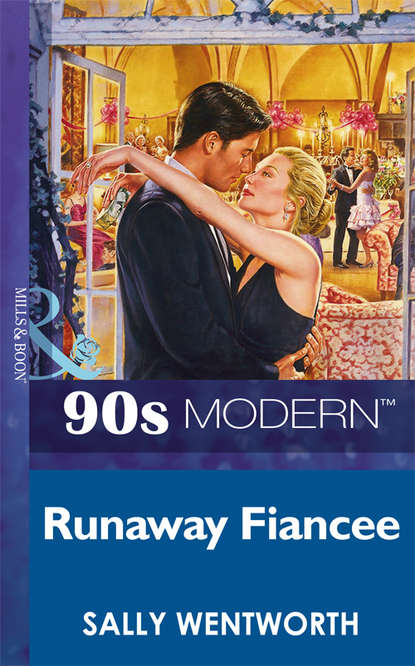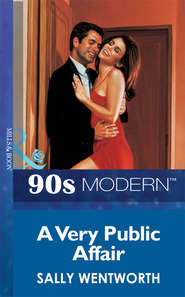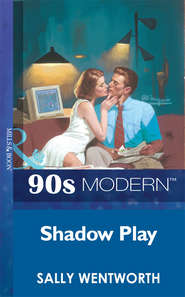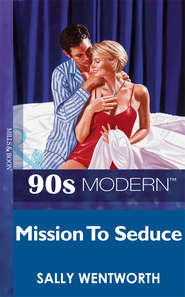По всем вопросам обращайтесь на: info@litportal.ru
(©) 2003-2024.
✖
Runaway Fiancee
Автор
Год написания книги
2018
Настройки чтения
Размер шрифта
Высота строк
Поля
He met her gaze squarely. ‘I know that. I shall have to get to know you all over again.’
‘But you don’t like what I am.’ It was a positive statement.
‘What makes you think that?’
She sat back, but kept her eyes on his face. ‘You make your disapproval very obvious.’
‘I’m sorry. I don’t disapprove of you; I just find the change in you difficult to accept, that’s all.’
‘I expect people change when their circumstances change.’
With a sudden smile, Milo said, ‘Now that is a very wise and experienced remark.’
She gazed at him for a moment, taken aback by the smile, then flicked her eyes away. ‘You didn’t tell me what happened to my father,’ she reminded him.
‘I’m afraid he died. He had a heart attack some years ago.’ Paige merely nodded and he said, ‘It means nothing to you?’
She gave him an irritated look. ‘What do you expect me to do—throw myself down and weep because someone I can’t remember has died? Someone, from what you’ve told me, who more or less abandoned me? Of course it means nothing to me.’
Suddenly they were out of the tunnel and into daylight again. The train slowed for its journey through the Kent countryside and Paige looked out of the window for a few minutes before turning to Milo and saying, ‘Is that it? Is that the sum total of this famous family you were going to tell me about?’
He nodded. ‘That’s about it.’
‘So I’ve a mother, and presumably a stepfather, who live in Argentina. And a grandmother. Is that all?’
‘I believe you have some relations on your father’s side—cousins, that kind of thing—but no one close. And you have aunts and cousins in England on your grandmother’s side of the family. I’m afraid neither of us comes from very productive lines.’
‘When I marry Jean-Louis I intend to have a large family, six children at least,’ she told him provocatively.
‘Have you told him that?’
Smiling, she said, ‘Jean-Louis is a very earthy person. He likes the sun and the open air, he loves light and colour. He’s not like you.’ Her eyes went over him disparagingly. ‘You’re an indoor person, without imagination, grey and colourless.’
To her immense surprise Milo laughed, the first time she’d known him to do so. ‘If you think that then you, too, have got some relearning to do.’
Soon the train pulled into London and they got into the car again. It was only then that Paige asked, ‘Where are we going?’
‘To your flat.’
‘My flat? I have an apartment of my own?’
‘Yes. In Chelsea.’
It turned out to be a garden flat in one of the quiet, tree-lined streets that led down to the River Thames. An old house of dark, weathered brick with a smartly painted black front door. Very respectable, very genteel. As she got out of the car Paige looked at the street and the house with strong distaste. Taking a small bunch of keys from his pocket, Milo unlocked the door.
‘You have a key to my flat?’
He glanced at her. ‘You left your keys behind when you—went away.’
He stood back to let her enter and Paige stepped past him into a hallway. There were two front doors facing her. The one on the left had the letter A and a name-plate holding a card saying ‘Major (Rtd.) and Mrs C.D. Davieson’. The door on the right had the letter B, but the name-plate was empty. After unlocking the latter, Milo again stood back.
Aware that he was watching her, Paige pushed open the door. There was an inner lobby that gave on to a corridor lined with framed nineteenth-century prints. The floor was carpeted and the air was warm. There was no dust on the hall table that stood against the wall, no smell of mustiness, only of beeswax polish. No feeling that the place had been empty and neglected for nearly a year. Slowly she walked to the nearest door and pushed it open. It was a sitting-room, quite large and ornate with an elaborate plasterwork ceiling, and luxuriously decorated in shades of cream and pale green, the carpet thick, the curtains opulently swathed. There was a wooden-framed reproduction three-piece suite, again in pale green, that hardly looked inviting; in fact it looked almost unused. There was a bookcase with leather-backed volumes—they didn’t look interesting enough to be called books—which had probably been chosen for their decorative effect, and a couple of brass lamps with cream shades. A television set hidden away in a cabinet and a music stack concealed in its twin seemed to be the only concession to modern life.
Paige opened the doors of the cabinets, made a face, and walked out of the room to look at the rest of the place. There was a dining room with a pedestal table and six chairs that looked genuine antiques instead of reproduction, a kitchen with pseudo country fitted cupboards and, at the back of the house looking over the garden, a large bedroom. It had a four-poster bed, a dressing table and fitted wardrobes across the whole of one wall. She stood for a long moment looking round the room, then opened the door of one of the wardrobes and looked at the clothes. Pulling some out, Paige saw that they were mostly neat suits with straight, tailored skirts and jackets, and to wear with them there were long-sleeved silk blouses in pale colours. With an angry gesture she tossed them onto the bed and jerked open more doors. Every kind of clothes a girl would need, and all expensively made, but they were all drab, drab, drab!
Turning on Milo, she said vehemently, ‘You have got to have made a mistake. No way could I ever have worn all these dull clothes!’
His lips twitched. ‘I assure you, you did. And you looked extremely good in them.’
‘I don’t believe it. Even a nun wouldn’t look good in these—’ words failed her ‘—these uniforms!’
Milo laughed outright ‘I rather think you’re working up to a good excuse to go shopping.’
Smiling in return, Paige said, ‘I don’t need an excuse to go shopping.’
There was a door in the far wall. Going over to it, she found that it led into a bathroom, the bath white, the walls pale green again.
‘Is this a rented flat?’ she asked in dissatisfaction.
‘No, it belongs to you.’
‘And did I choose the decor?’
‘No, I believe your grandmother hired a firm of decorators to do it while you were still in India. She wanted it to be a surprise for you on your return.’
‘I see.’
‘If you don’t like it you can always change it.’ The suggestion had been put in a mild voice but Paige didn’t miss the implications. With a shrug, she said, ‘What do I care? I shan’t be staying here.’
Milo didn’t argue, just said, ‘I’ll get your suitcase.’
Paige followed him into the corridor just as someone turned a key in the front door and came in. It was an elderly grey-haired woman, thin and very upright, wearing a pale blue woollen suit.
‘Paige, my dear.’ The woman stepped forward with her hands outstretched. ‘How wonderful that you’re back. I was so excited when Milo rang to tell me.’
Milo stood back but Paige caught his sleeve. ‘Who is it? Is it my grandmother?’
A disappointed look came into his eyes. ‘No. This is Mrs Davieson who lives in the flat upstairs.’ He turned to the other woman. ‘As I told you, Paige is suffering from loss of memory. I’m afraid she doesn’t remember you.’
‘How dreadful!’ the woman exclaimed. ‘But you mustn’t worry about a thing. The Major and I will take care of you till your grandmother gets here. We’re old friends of hers, you know; she and I knew each other as children out in India and then we were at school together.’
‘Really?’ Paige looked down at the outstretched hands. ‘I see you have a key to the flat.’
‘Oh, yes, we’ve been looking after the place for you.’
Paige frowned, not being able to imagine it. ‘You’ve been doing the cleaning?’
‘No, not personally, of course.’ Mrs Davieson tittered with amusement at the idea. ‘But making sure the cleaner and the gardener do their work properly, informing Milo here of any maintenance work that needed to be done, that sort of thing. Absolutely essential, of course, when the owner is away.’











